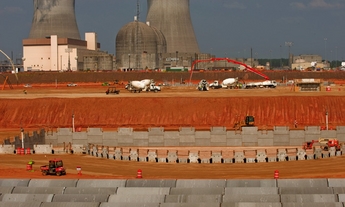The US Nuclear Regulatory Commission has completed its Final Safety Evaluation Report (FSER) for a limited work authorization (LWA) and Combined Licenses (COL) for the proposed Vogtle Units 3 and 4 reactors.

The NRC, in its FSER, concluded that there are no safety aspects that would preclude issuing the LWA and COL for construction and operation of the proposed reactor site, near Waynesboro, Ga. Southern Company is planning to build two 1100MWe AP1000s on the site.
This action allows the hearing process to begin before the commission votes on the issuance of the Vogtle COL. The FSER and Final Supplemental Environmental Impact Statement (FSEIS) will be provided to the Commission itself for the mandatory hearing phase of the licensing process. In the mandatory hearing, expected to take place this fall, the Commission will determine whether the staff’s review has been adequate to support the findings necessary to issue a COL. In addition, because the Vogtle COL application references the amended AP1000 design, the Commission must complete the certification process for that design before it can render a mandatory hearing decision on the COL.
Upon receipt of the COL, full construction can commence at the site. Southern Nuclear has been working under a Limited Work Authorization permit since 2009, which allows for certain safety-related construction activities.
Southern Nuclear is overseeing construction and will operate the two new 1100-megawatt AP1000 units for Georgia Power and co-owners Oglethorpe Power Corporation, the Municipal Electric Authority of Georgia and Dalton Utilities. Georgia Power owns 45.7 percent of the new units
Related ArticlesNational programmes – where do they stand now?
| Editor's note |
| This article was written before the natural disaster in Japan, and the emergency operations at the Fukushima-Daiichi nuclear power plant, which have received wide international media coverage. Fears of the risks of radiation in the general public may delay any new-build nuclear market development plans. However, despite these concerns, nuclear power offers a real opportunity for the region to generate low-carbon electricity, and reduce dependence on fossil fuels, which is sorely needed. |




